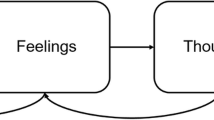Abstract
Previous research has shown that smokers progress through a series of stages of change as they attempt to quit their habit. This study evaluated smokers in the precontemplation and contemplation stages in order to explore how we can effectively facilitate positive stage transition. Precontemplators (n = 71) and contemplators (n = 30) were compared in terms of two types of expectancies: self-efficacy beliefs and response outcome expectancies. Stage of change was defined according to both categorical and continuous dimensions, each of which led to different results. The findings are discussed in terms of their potential applications to smoking cessation programs and their implications regarding the stage model of change.
Similar content being viewed by others
REFERENCES
Bandura, A. (1986). Social foundations of thought and action: A social cognitive theory. Englewood Cliffs, NJ: Prentice Hall.
Biener, L., &; Abrams, D. B. (1991). The contemplation ladder: Validation of a measure of readiness to consider smoking cessation. Health Psychology, 10, 360-365.
Budd, R. J., &; Rollnick, S. (1996). The structure of the Readiness to Change Questionnaire: A test of Prochaska and DiClemente's transtheoretical model. British Journal of Health Psychology, 1, 365-376.
Centers for Disease Control and Prevention, National Center for Chronic Disease Prevention and Health Promotion. (n.d.). Tobacco information and prevention source. Retrieved March 10, 2004, from http://www.cdc.gov/ tobacco/issue.htm
Davidson, R. (1998). The transtheoretical model: A critical overview. In W. R. Miller &; N. Heather (Eds.), Treating addictive behaviors (pp. 25-38). New York: Plenum Press.
Davison, G. C., Robins, C., &; Johnson, M. K. (1983). Articulated thoughts during simulated situations: A paradigm for studying cognition in emotion and behavior. Cognitive Therapy and Research, 7, 17-40.
De Vries, H., Mudde, A. N., Dijkstra, A., &; Willemsen, M. C. (1998). Differential beliefs, perceived social influences, and self-efficacy expectations among smokers in various motivational phases. Preventive Medicine, 27, 681-689.
DiClemente, C. C., Prochaska, J. O., Fairhurst, S. K., Velicer, W. F., Velasquez, M. M., &; Rossi, J. S. (1991). The process of smoking cessation: An analysis of precontemplation, contemplation, and preparation stages of change. Journal of Consulting and Clinical Psychology, 59, 295-304.
Dijkstra, A., De Vries, H., &; Bakker, M. (1996). Pros and cons of quitting, self-efficacy, and the stages of change in smoking cessation. Journal of Consulting and Clinical Psychology, 64, 758-763.
Donovan, R. J., Jones, S., Holman, C. D. J., &; Corti, B. (1998). Assessing the reliability of a stage of change scale. Health and Education Research, 13, 285-291.
Eckhardt, C. I., Barbour, K. A., &; Davison, G. C. (1998). Articulated thoughts of maritally violent and nonviolent men during anger arousal. Journal of Consulting and Clinical Psychology, 66, 259-269.
Haaga, D. A. F. (1989). Articulated thoughts and endorsement procedures for cognitive assessment in the prediction of smoking relapse. Psychological Assessment: A Journal of Consulting and Clinical Psychology, 1, 112-117.
Heatherton, T. F., Kozlowski, L. T., Frecker, R. C., &; Fagerstrom, K. O. (1991). The Fagerstrom Test for Nicotine Dependence: A revision of the Fagerstrom Tolerance Questionnaire. British Journal of Addiction, 86, 1119-1127.
Jones, B. T., &; McMahon, J. (1998). Alcohol motivations as outcome expectancies. In W. R. Miller &; N. Heather (Eds.), Treating addictive behaviors (pp. 75-91). New York: Plenum Press.
McConnaughy, E. A., DiClemente, C. C., Prochaska, J. O., &; Velicer, W. F. (1989). Stages of change in psychotherapy: A follow-up report. Psychotherapy, 26, 494-503.
Pomerleau, C. S., Carton, S. M., Lutzke, M. L., Flessland, K. A., &; Pomerleau, O. F. (1994). Reliability of the Fagerstrom Tolerance Questionnaire and the Fagerstrom Test for Nicotine Dependence. Addictive Behaviors, 19, 33-39.
Prochaska, J. O. (1996a). Revolution in health promotion: Smoking cessation as a case study. In R. J. Resnick &; R. H. Rozensky (Eds.), Health psychology through the lifespan: Practice and research opportunities (pp. 361-375). Washington, DC: American Psychological Association.
Prochaska, J. O. (1996b). A stage paradigm for integrating clinical and public health approaches to smoking cessation. Addictive Behaviors, 21, 721-732.
Prochaska, J. O. (2000). Change at different stages. In C. R. Synder &; R. E. Ingram (Eds.), Handbook of psychological change: Psychotherapy processes and practices for the 21st century (pp. 109-127). New York: John Wiley and Sons.
Prochaska, J. O., DiClemente, C. C., &; Norcross, J. C. (1992). In search of how people change: Applications to addictive behaviors. American Psychologist, 47, 1102-1114.
Prochaska, J. O., Norcross, J. C., &; DiClemente, C. C. (1994). Changing for good. New York: Avon Books.
Prochaska, J. O., Velicer, W. F., Fava, J. L., Rossi, J. S., &; Tsoh, J. Y. (2001). Evaluating a population-based recruitment approach and a stage-based expert system intervention for smoking cessation. Addictive Behaviors, 26, 583-602.
Prochaska, J. O., Velicer, W. F., Rossi, J. S., Goldstein, M. G., Marcus, B. H., Rakowski, W., et al. (1994). Stages of change and decisional balance for 12 problem behaviors. Health Psychology, 13, 39-46.
Smith, T. W. (1989). Assessment in rational-emotive therapy: Empirical access to the ABCD model. In M. E. Bernard &; R. DiGiuseppe (Eds.), Inside rational-emotive therapy: A critical appraisal of the theory and therapy of Albert Ellis (pp. 135-153). San Diego, CA: Academic Press.
Snow, M. G., Prochaska, J. O., &; Rossi, J. S. (1992). Stages of change for smoking cessation among former problem drinkers: A cross-sectional analysis. Journal of Substance Abuse, 4, 107-116.
Author information
Authors and Affiliations
Corresponding author
Rights and permissions
About this article
Cite this article
Pearlman, M.Y., Wernicke, R., Thorndike, F. et al. Stages of Change in Smoking Cessation: A Comparison of Expectancies Among Precontemplators and Contemplators. Journal of Rational-Emotive & Cognitive-Behavior Therapy 22, 131–147 (2004). https://doi.org/10.1023/B:JORE.0000025442.74022.82
Issue Date:
DOI: https://doi.org/10.1023/B:JORE.0000025442.74022.82




